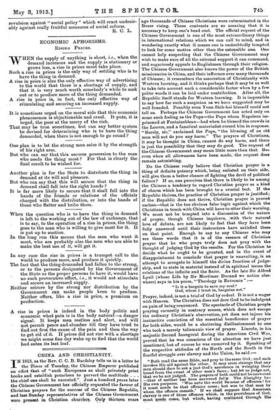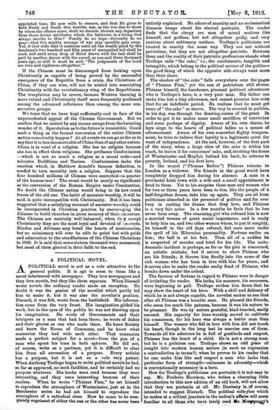CHINA AND CHRISTIANITY.
IN 1813, as the Rev. C. C. B. Bardsley tells us in a letter to the Times of Tuesday, the Chinese Emperor published an edict that of " such Europeans as shall privately print books and establish preachers to pervert the multitude . . the chief one shall be executed.". Just a hundred years later the Chinese Government has officially requested the favour of Christian prayers for the success of the Chinese Republic, and last Sunday representatives of the Chinese Government were present in Christian churches. Only thirteen years
ago thousands of Chinese Christians were exterminated in the Boxer rising. These contrasts are so amazing that it is necessary to keep one's head cool. The official request of the Chinese Government is one of the most extraordinary things in international relations which we can call to mind, and in wondering exactly what it means one is undoubtedly tempted to look for some motive other than the ostensible one. One cannot help suspecting that the Chinese Government may wish to make sure of all the external support it can command, and sagaciously appeals to Englishmen through their religion. The Chinese Government also knows the power of the British missionaries in China, and their influence over many thousands of Chinese; it remembers the association of Christianity with Western learning, and it thinks perhaps that it may be as well to take into account such a considerable factor when by a few polite words it can he laid under contribution. After all, the Republic itself stands for Western learning. It is impossible to say how far such a suspicion as we have suggested may be well founded. Possibly even Yuan Shih-kai himself could not tell us. Perhaps the Chinese Government has acted only on some such feeling as the Pope—the Pope whom Napoleon im- prisoned at Fontainebleau—had when he blessed the crowds in the Louvre, and a fanatical materialist cursed him in response. " Surely, sir," exclaimed the Pope, " the blessing of an old man will not do you any harm." The prayers of Christians, it may be thought in China, cannot do any harm, and there is just the possibility that they may do good. The request of the Chinese Government may mean little more than that. Btu: even when all allowances have been made, the request does remain astonishing.
Do the Chinese really believe that Christian prayer is a thing of definite potency which, being enlisted on their side. will give them a better chance of fighting the devil of political failure ? If so, one perceives that there is likely to be among the Chinese a tendency to regard Christian prayer as a kind of charm which has been brought to a crucial test. If the Republic thrives, the practice of Christian prayer is justified; if the Republic does not thrive, Christian prayer is proved useless—that is the too obvious false logic against which the Christians in touch with China will have to utter their warning. We must not be tempted into a discussion of the nature of prayer, though Chinese inquirers, with their natural love of debate, are not likely to feel that they have been fully answered until their instructors have satisfied them on that point. Enough to say to any Chinese who may see these words that it is of the essence of Christian prayer that he who prays truly does not pray with the thought of judging God by the results. For the Christian to decide what he ought to be granted, and in the event of disappointment to conclude that prayer is unavailing, is an attempt to arrogate to himself the divine function of judge- ship, and to state in material instead of in spiritual terms the relations of the infinite and the finite. As the late Sir Alfred Lyall (whose Life by Sir Mortimer Durand we notice else- where) says in his poem, " Theology in Extremis "
"Is it a bargain to save my soul ? God, whom I trust in, bargains not."
Prayer, indeed, is not a trial of God by ordeal. It is not a wager with Heaven. The Christian does not dare God to be indulgent
on pain of being renounced. The spectacle of Christian people praying earnestly in contrary senses, which does not escape the ordinary Christian's observation, yet does not injure his instinctive conviction of the essential beneficence of prayer for both sides, would be a shattering disillusionment to one who took a merely talismanic view of prayer. Lincoln, in his majestic Second Inaugural during the American Civil War, proved that he was conscious of the situation we have just mentioned, but of course he was unmoved by it. Speaking of the respective attitudes of the North and the South in the fearful struggle over slavery and the Union, he said :— " Both read the same Bible, and pray to the same God ; and each invokes His aid against the other. It may seem strange that any mon should dare to ask a just God's assistance in wringing their bread from the sweat of other men's faces ; but let us judge not, that we be not judged. The prayers of both could not be answered —that of neither has been answered fuEy. Tho Almighty hai His own purposes. 'Woo unto the world because of offences ! for it must needs be that offences come; but woe to that man by whom the offence cometh.' If we shall suppose that American slavery is one of those offences which, in the providence of God. must Reeds come, but which, having continued through His
appointed time, He now wills to remove, and that He gives to both North and South this terrible war, as the woe due to those by whom the offence came, shall we discern therein any departure from those divine attributes which the believers in a living God always ascribe to Him ? Fondly do wo hope—fervently do we pray—that this mighty scourge of war may speedily pass away. Yet, if God wills that it continue until all the wealth piled by the bondman's two hundred and fifty years of unrequited toil shall be sunk, and until every drop of blood drawn with the lash shall be paid by another drawn with the sword, as was said three thousand years ago, so still it must be said, The judgments of the Lord are true and righteous altogether.'"
If the Chinese must be discouraged from looking upon Christianity as capable of being proved by the successful emergence of the Republic from a crisis, the Christians of
China, if they are wise, will not be misled into associating Christianity with the revolutionary wing of the Republicans. The temptation may be severe, because Western learning is more valued and Christianity itself more frequently professed among the advanced reformers than among the more con- servative grows.
We trust that we have kept sufficiently cool in face of the unprecedented appeal of the Chinese Government. But we confess that we cannot by any means escape from the haunting wonder of it. Speculation as to the future is irresistible. Could such a thing as the formal conversion of the entire Chinese nation conceivably happen P At all events we can go so far as to say that it is less inconceivable of China than of any other nation.
China is in want of a religion. She has no religion because she has in effect three religions. She professes Confucianism —which is not so much a religion as a moral code—and tolerates Buddhism and Taoism. Confucianism lacks the emotion which, in Matthew Arnold's famous definition, is needed to turn morality into a religion. Suppose that the four hundred millions of Chinese were converted—a quarter of the human race ! The event would be nearly as significant as the conversion of the Roman Empire under Constantine. No doubt the Chinese nation would bring to its new creed traces of the old one. The habit of ancestor-worship, it will be said, is quite incompatible with Christianity. But it has been suggested that a satisfying remnant of ancestor-worship could be incorporated in Christian practice by encouraging the Chinese to build churches in pious memory of their an2estors.
The Chinese are mentally well balanced; when tiny accept Christianity they are the most loyal and devoted of t oiverts. Hindus and Africans may break the hearts of missionaries, but no missionary will ever be able to point but with pride and admiration to the steadfastness of the Chinese Christians in 1900. It is said that some sixteen thousand were massacred, but most of them gloried in their faith to the end.



















































 Previous page
Previous page